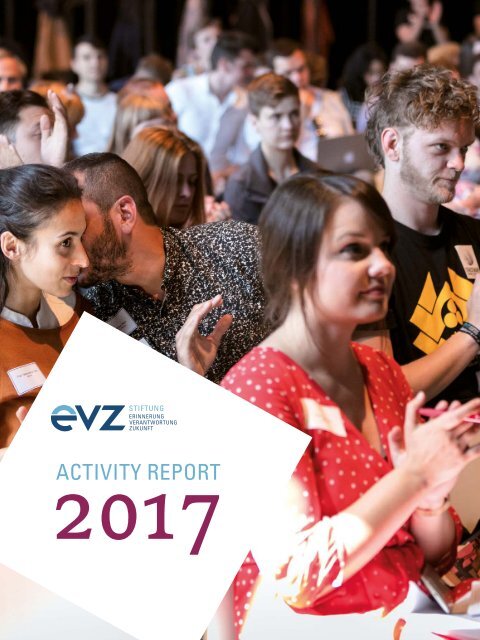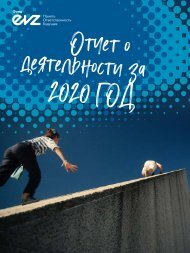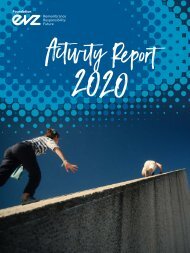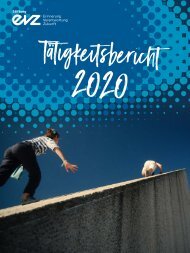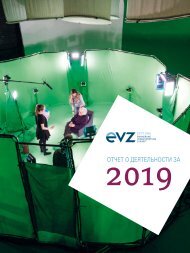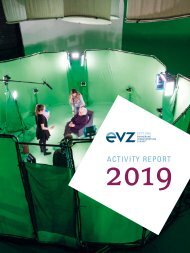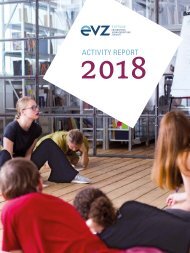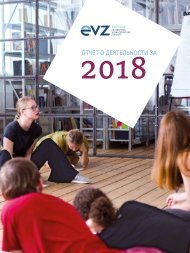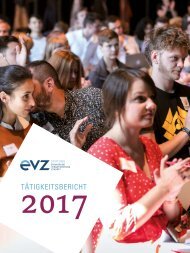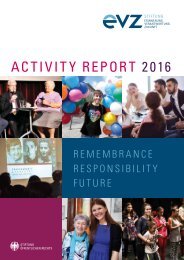Activity report EVZ Foundation 2017
You also want an ePaper? Increase the reach of your titles
YUMPU automatically turns print PDFs into web optimized ePapers that Google loves.
ACTIVITY REPORT<br />
<strong>2017</strong>
ACTIVITY REPORT<br />
<strong>2017</strong>
Who we are …<br />
… and what we do<br />
The <strong>Foundation</strong> “Remembrance, Responsibility and Future” (German acronym <strong>EVZ</strong>) was established<br />
in the year 2000 in order to pay compensation to former forced labourers during the period<br />
of National Socialism (NS). Since 2001, the <strong>EVZ</strong> <strong>Foundation</strong> has also granted humanitarian aid to<br />
survivors, promoted a critical examination of history and strengthened civic involvement in Central<br />
and Eastern Europe.<br />
Foreword 4<br />
What we funded 6<br />
The Board of Trustees of the <strong>EVZ</strong> <strong>Foundation</strong> 8<br />
News from the Board of Trustees and the Board of Directors 12<br />
Overview of the fields of activity of the <strong>EVZ</strong> <strong>Foundation</strong> 16<br />
<strong>EVZ</strong> expanded – Welcome to the laboratory of new funding formats 18<br />
A critical examination of history 20<br />
Working for human rights 28<br />
Commitment to the victims of National Socialism 36<br />
Press and public relations 44<br />
Finances and administration 50<br />
Financial <strong>report</strong> 54<br />
About this publication 60<br />
2 THE FOUNDATION “REMEMBRANCE, RESPONSIBILITY AND FUTURE” (<strong>EVZ</strong>) TABLE OF CONTENTS 3
and Europe and remember the victims of National Socialism. But how can an international funding<br />
organisation like the <strong>Foundation</strong> “Remembrance, Responsibility and Future” [Erinnerung, Verantwortung<br />
und Zukunft] (<strong>EVZ</strong>) influence these challenging developments? How to promote social<br />
cohesion, which is threatened by the process of disintegration through the rise in populism?<br />
In order to be able to react promptly and consistently to the burning issues of civil society as a reliable<br />
partner, we evaluate the funding provided in our three fields of activity and draw up programmes<br />
that are viable in the long term. Where can we develop our existing situation further;<br />
where can we explore new formats for providing funding? The new team, <strong>EVZ</strong> expanded, has been<br />
acting as the engine for developing strategy since the middle of <strong>2017</strong>. The projects funded in this<br />
field have been verified for their innovation and designed in close collaboration with the agencies<br />
implementing them. This means that added value is created for the project partnerships as well<br />
as for the <strong>Foundation</strong>, which has an effect on the internal structures and procedures of funded<br />
activities.<br />
The division of the existing areas of activity in <strong>2017</strong> into smaller, more agile teams is another developmental<br />
step, which you will also see in this <strong>report</strong> on our activity. In addition, last year resulted<br />
in some changes to key positions at the <strong>Foundation</strong>: on the one hand we would like to welcome<br />
Dr Harald Braun as Chairman of the Board of Trustees and look forward to having an experienced<br />
diplomat at our side. On the other hand, Dr Moritz Kilger will provide the Management Board with<br />
valuable expertise and visionary ideas for the management of the <strong>Foundation</strong>. Last but not least,<br />
our move to office premises with the latest equipment at Friedrichstraße 200 is probably the most<br />
eye-catching sign of the restructuring process that has now begun.<br />
Dear Readers,<br />
Dear Friends of the <strong>EVZ</strong> <strong>Foundation</strong>,<br />
“Words can be like tiny doses of arsenic; they are swallowed without noticing, they appear to have<br />
no effect, and yet after a while the poisonous effect becomes apparent,” wrote Victor Klemperer<br />
in LTI – Notizbuch eines Philologen 1 . In his analysis of the language of the Third Reich published in<br />
1947, Klemperer illustrates how the NS ideology subtly entered everyday speech and the heads of<br />
innumerable people via its vocabulary.<br />
On the following pages we present some exciting, selected projects from the <strong>2017</strong> <strong>Foundation</strong> year.<br />
At the same time, we would like to thank you, who support our work, for an eventful year. This is<br />
because it is only together with you as a self-supporting network of partners that we can be successful<br />
in standing up for an open society.<br />
We hope you enjoy reading this activity <strong>report</strong> and look forward to our contact with you over the<br />
coming year.<br />
In <strong>2017</strong>, 70 years later, this clever description of the power of speech experienced a new, sad topicality:<br />
we can see that the unwritten rules of what can be said are being renegotiated.Over recent<br />
years, right-wing populist agitation and discriminatory attributions have moved away from the<br />
anonymity afforded by social media. They penetrate public debates and are becoming socially acceptable.<br />
Dr Andreas Eberhardt<br />
Chief Executive Officer<br />
Dr Moritz Kilger<br />
Co-Director<br />
In a period during which European societies appear more susceptible to nationalistic slogans,<br />
the observations of the NS contemporary witness Klemperer are both a warning and an incentive.<br />
Seldom have we been so aware of the need to act decisively against the revision of history<br />
and isolation of minorities, to strengthen democratic values and human rights in Germany<br />
1 Name of the English edition: Language of the Third Reich: LTI – Lingua Tertii Imperii: A Philologist’s Notebook<br />
4 FOREWORD<br />
FOREWORD 5
What we<br />
funded<br />
324<br />
projects with<br />
9.6 mio.<br />
EUR<br />
have been supported in <strong>2017</strong>.<br />
203<br />
historical eyewitnesses <strong>report</strong>ed about<br />
4,674<br />
their lives in 54 different projects.<br />
Projects have been supported with EUR 121.9 million<br />
A critical<br />
155<br />
examination of history:<br />
projects with EUR 3.9 million<br />
(including third-party funds) since the creation of<br />
the <strong>Foundation</strong> in 2000.<br />
Commitment to the victims of National Socialism:<br />
78<br />
projects with EUR 3.2 million<br />
Working<br />
91<br />
for human rights:<br />
projects with EUR 2.6 million<br />
As at: 31.12.<strong>2017</strong><br />
6 WHAT WE FUNDED<br />
WHAT WE FUNDED 7
The Board of Trustees of the<br />
<strong>EVZ</strong> <strong>Foundation</strong><br />
Dr Christian Nell, Dr Tomáš Jelínek,<br />
Dariusz Pawłoś, Arie Zuckerman, Anshelika Anoschko,<br />
Konrad Matschke, Dr Jörg Freiherr Frank von Fürstenwerth,<br />
Wladimir P. Lukin, Svyatoslav Scheremeta, Lucia Puttrich, Alina Shpak,<br />
Dr Harald Braun, Dr Jiři Šitler, Ulla Jelpke, Dr Wladimir Adamuschko,<br />
Dr Susanne Sophia Spiliotis, Shari C. Reig, Christiane Reeh, Dr Dirk Förterer,<br />
Hiltrud Lotze, Ruhan Karakul, Dr Wolfgang Malchow, Dr Kurt Bley, Ulle Schauws,<br />
Andreas Klugescheid, Peter Schatzer, Dr Jost Rebentisch, Karin Maag (from left to right)<br />
All the members of the Board of Trustees and their respective deputies can be found at<br />
www.stiftung-evz.de/board-of-trustees.<br />
8 THE BOARD OF TRUSTEES OF THE <strong>EVZ</strong> FOUNDATION<br />
THE BOARD OF TRUSTEES OF THE <strong>EVZ</strong> FOUNDATION 9
The Board of Trustees<br />
of the <strong>EVZ</strong> <strong>Foundation</strong><br />
Tasks of the Board of Trustees of the <strong>EVZ</strong> <strong>Foundation</strong><br />
As the supervisory body of the <strong>EVZ</strong> <strong>Foundation</strong>, the Board of Trustees decides all the fundamental<br />
questions regarding the fields of activity of the <strong>Foundation</strong>, in particular the adoption of the<br />
budget. The Board of Trustees is composed of international members. Its 27 members serve for<br />
four years and are appointed by the German Bundestag and the Bundesrat (Federal Council), German<br />
businesses, and the states and organisations involved in the international negotiations that<br />
established the <strong>EVZ</strong> <strong>Foundation</strong>. The current term of office of the Board of Trustees began on 1 September<br />
2016. The Chairman of the Board of Trustees and his deputy are appointed by the Federal<br />
Chancellor.<br />
10 THE BOARD OF TRUSTEES OF THE <strong>EVZ</strong> FOUNDATION<br />
THE BOARD OF TRUSTEES OF THE <strong>EVZ</strong> FOUNDATION 11
News from the Board of<br />
Trustees and the Board<br />
of Directors<br />
Farewell to Dr Michael Jansen and<br />
Günter Saathoff<br />
At the end of June, the <strong>EVZ</strong> <strong>Foundation</strong> in Berlin<br />
bid farewell to its long-standing Chairman<br />
of the Board of Directors Dr Michael Jansen,<br />
and Director Günter Saathoff. The Board members<br />
and staff of the <strong>EVZ</strong> <strong>Foundation</strong> thank Dr<br />
Michael Jansen and Günter Saathoff for their<br />
many years of dedicated work and wish them<br />
all the best for the future.<br />
Three questions to …<br />
Dr Harald Braun<br />
On 1 July <strong>2017</strong>, Dr Harald Braun, the former State Secretary of the Department of Foreign Affairs,<br />
was appointed to the position of Chairman of the Board of Trustees of the <strong>EVZ</strong> <strong>Foundation</strong> by the<br />
Federal Chancellor Dr Angela Merkel. As Germany’s Ambassador, he had been the country’s permanent<br />
representative at the United Nations in New York and Vice-Chairman of the UN General<br />
Assembly until the end of July <strong>2017</strong>.<br />
The new Chairman of the Board of Trustees of the <strong>EVZ</strong> <strong>Foundation</strong> talks about the focus of the<br />
<strong>Foundation</strong>’s work, historic responsibility and a particular concern of his.<br />
What are your major priorities for the forthcoming work of the <strong>Foundation</strong>?<br />
Dr Harald Braun: You mean the new issues that we, the Management Board and Chairman of the<br />
Board of Trustees, want to tackle together? Although the compensation payments to victims of<br />
forced and slave labour have largely been completed, we must naturally not forget the aspect of<br />
remembrance. However, the work on remembrance will no longer be so much at the heart of the<br />
<strong>Foundation</strong>’s activity, as was still the case when a large number of victims of the first generation<br />
were compensated and supported. This means that the two other aspects of the <strong>Foundation</strong>, namely<br />
responsibility and future, will have to come into focus more for the future work of the <strong>Foundation</strong>.<br />
I will continue to exchange ideas in this direction with the members of the Board of Trustees,<br />
the Management Board and the employees of the <strong>Foundation</strong>.<br />
How relevant is historic responsibility in Germany today?<br />
Dr Harald Braun: The generation that bears responsibility in Germany today has no living memory<br />
of the period of National Socialism. Even some of the older ones amongst us like myself were born<br />
after the Second World War. However, even if we feel no personal guilt for what was carried out in<br />
the name of Germany in the 20th century, it must remain our objective to assume responsibility<br />
for history. Responsibility always means taking action. For me this action means learning from remembering<br />
and showing the current and future generations in Germany, but also in Europe and<br />
other regions of the world, what the risks are if totalitarian and inhuman ideologies come to power<br />
and legitimise the most serious breaches of human rights and even institutionalise them.<br />
Your first trip after your appointment was to Ukraine. Why?<br />
Dr Harald Braun: From a geographical perspective the <strong>EVZ</strong> <strong>Foundation</strong> had two focus countries,<br />
namely Poland and Ukraine, owing to the scope and severity of forced and slave labour there. I live<br />
partly in Berlin, so Poland is very close. I have often been there and know the country better than<br />
Ukraine. I therefore particularly wanted to travel to Ukraine as the first country in a number of<br />
states with which the <strong>Foundation</strong> works. I was able to combine the visit to organisations running<br />
projects and boards of trustees on site with an invitation to an international conference in Kiev.<br />
You can find the full interview with Dr Harald Braun at www.stiftung-evz.de/board-of-trustees.<br />
12 NEWS FROM THE BOARD OF TRUSTEES AND THE BOARD OF DIRECTORS<br />
NEWS FROM THE BOARD OF TRUSTEES AND THE BOARD OF DIRECTORS 13
Dr Moritz Kilger, new member of<br />
the Board of Directors<br />
Dr Moritz Kilger, born in 1975, has been a member<br />
of the Board of Directors of the <strong>EVZ</strong> <strong>Foundation</strong><br />
since 1 July <strong>2017</strong>. He was appointed by<br />
the Board of Trustees of the <strong>Foundation</strong> for four<br />
years. The focus of his previous professional<br />
career has been formal and non-formal educational<br />
courses, organisational development and<br />
business and finance. Moritz Kilger worked as<br />
Head of the <strong>Foundation</strong> “Europäische Jugendbildungs-<br />
und Jugendbegegnungsstätte Weimar”<br />
(European Youth Education and Meeting<br />
Centre in Weimar, EJBW) from 2012 until <strong>2017</strong>.<br />
Andreas Eberhardt<br />
Moritz Kilger<br />
Luisa Maria Schweizer<br />
Monika Bertele<br />
Jacqueline Rux<br />
“I am very much looking forward to the challenges that await me as a member of the Board of Directors<br />
and I would like to thank the Board of Trustees for the trust they have placed in me. It’s an appealing<br />
task to support the strategic process of the future development of the <strong>EVZ</strong> <strong>Foundation</strong>, an international<br />
institution with a unique founding history and almost 20 years of funding activity. What does a contemporary<br />
funding profile in the area of tension between the past and future look like? How is it<br />
possible to strengthen democracy in a pluralistic, digital society? To what extent does the economic<br />
character of a society contribute to its social cohesion?<br />
The <strong>EVZ</strong> <strong>Foundation</strong> must also inwardly experience the values it upholds in order to find credible<br />
answers to these questions. I would like to devote myself fully together with the committed staff<br />
at the <strong>Foundation</strong> to this exciting process of the development of the organisation and the new<br />
direction of the <strong>Foundation</strong>’s work in terms of content.”<br />
14 NEWS FROM THE BOARD OF TRUSTEES AND THE BOARD OF DIRECTORS<br />
NEWS FROM THE BOARD OF TRUSTEES AND THE BOARD OF DIRECTORS 15
Fields of activity<br />
of the <strong>EVZ</strong><br />
<strong>Foundation</strong><br />
Commitment to the victims of<br />
National Socialism<br />
Goals<br />
· To fund projects that allow now elderly<br />
victims of National Socialism to lead a life<br />
with dignity and autonomy, to improve<br />
their social situation and healthcare,<br />
and to engage them in inter-generational<br />
dialogue.<br />
· To strengthen initiatives in Israel, Central<br />
and Eastern Europe that promote greater<br />
solidarity with and willingness to help<br />
victims of forced labour and National<br />
Socialism at the local and international<br />
level.<br />
· In addition, the <strong>EVZ</strong> <strong>Foundation</strong> is committed<br />
internationally to strengthening<br />
the sense of responsibility for the interests<br />
of victims of National Socialism and for<br />
their participation in society.<br />
In accordance with its statutory remit, the <strong>EVZ</strong> <strong>Foundation</strong> funds<br />
international projects in three fields of activity:<br />
A critical examination of history<br />
Goals<br />
· To reflect on the history of National Socialism in the European<br />
collective memory.<br />
· To make the experiences of victims of National Socialism sustainably<br />
accessible for historical and political education.<br />
· To develop the culture of remembrance in Germany with a view<br />
to the challenges of a migration society. To expand the national<br />
historical perspective and to include other experiences of violence<br />
in the 20th century.<br />
Working for human rights<br />
Goals<br />
· To support international youth projects on human rights education<br />
in conjunction with historical learning.<br />
· To stand up determinedly against anti-Semitism, anti-Gypsyism<br />
and trans- and homophobia in Central and Eastern Europe.<br />
· Commitment to the concerns of minorities.<br />
· To strengthen Sinti and Roma by promoting educational projects<br />
and awarding scholarships.<br />
16 OVERVIEW OF THE FIELDS OF ACTIVITY<br />
OVERVIEW OF THE FIELDS OF ACTIVITY 17
<strong>EVZ</strong> expanded –<br />
Welcome to the laboratory<br />
for new funding formats<br />
In order to react promptly to the current challenges facing society and drive the strategic development<br />
of the <strong>Foundation</strong> forward, <strong>EVZ</strong> expanded is designing new methods and forward-looking<br />
funding formats. The term “expanded” stands for a committed and “expanded” team, which<br />
dares to tackle new issues methodically and topically: the “Think- and Do-Tank”, consisting of four<br />
women, supplements the long-term funding programmes in collaboration with our colleagues in<br />
the three areas of activity of the <strong>EVZ</strong> <strong>Foundation</strong>.<br />
#DisruptPopulism DemoDay<br />
At the #DisruptPopulism DemoDay at the beginning of June <strong>2017</strong>, digital project ideas were presented,<br />
which counter populism by various means and strengthen democracy and freedom of<br />
opinion. Thirty teams from Germany, Italy, Sweden and the USA submitted innovative proposals,<br />
and the best 11 initiatives were given the opportunity to present their ideas before a wide audience.<br />
The “Trace Map” project won recognition and was awarded first place. “Trace Map” is a digital<br />
map, in which the dissemination of press news and viral posts can be followed with the help of<br />
the URL, and urban concentrations can be covered by individual posts. This is intended to make the<br />
system of the rapid dissemination of fake news visible.<br />
DemoDay, promoted by <strong>EVZ</strong> expanded, and taking place during the Bundestag elections in <strong>2017</strong>,<br />
had the aim of encouraging the willingness of young, tech-savvy people to become involved in<br />
open societies. Through the 150 participants and a “speed dating” scheme to exchange ideas, the<br />
successful networking event had an impact beyond merely promoting its aims.<br />
Establishment of German-Israeli-American forum<br />
With the aim of giving players in civil society a platform for exchanging ideas about social cohesion,<br />
the <strong>EVZ</strong> <strong>Foundation</strong> initiated the “German-Israeli-American Comparative Social Cohesion<br />
Forum” in close collaboration with the Ted Arison Family <strong>Foundation</strong>. In June <strong>2017</strong> the <strong>Foundation</strong><br />
invited a total of 12 international institutions to share successful innovative civil society partnership<br />
strategies and discuss new approaches to promote social cohesion. The composition of its participants<br />
reflected the diversity of the countries involved and their societies.<br />
Through the Forum the <strong>EVZ</strong> <strong>Foundation</strong> strengthened transnational partnerships, which work towards<br />
open, fair and democratic societies, and therefore supported a promising network of relevant<br />
managers from three countries. The <strong>Foundation</strong> plans to continue the Forum for Social Cohesion<br />
in collaboration with the Ted Arison Family <strong>Foundation</strong> in 2018.<br />
Marianna Matzer<br />
Friederike Niemann<br />
Mechthild Schmidt<br />
Luisa Maria Schweizer<br />
18 <strong>EVZ</strong> expanded<br />
<strong>EVZ</strong> expanded 19
A critical<br />
examination<br />
of history<br />
Networking meeting as part<br />
of the “Migration and Culture of<br />
Remembrance” programme<br />
On 25 and 26 October <strong>2017</strong> the first networking meeting of the<br />
projects that have been funded so far in the “Migration and Culture<br />
of Remembrance” programme was held in Berlin to incorporate<br />
the points of view of all the programme agencies with a stake<br />
in the future direction of the programme.<br />
The <strong>EVZ</strong> <strong>Foundation</strong> would like to make its contribution to further<br />
developing cultures of remembrance in Germany through the funding<br />
programme. It is strengthening the position of agencies providing historical-political<br />
education to involve target groups, which so far have had little<br />
access to the German culture of remembrance. In particular, people with experience<br />
of migration and fleeing as refugees are being supported to commit to<br />
this cause. This is because society in Germany is facing a wide range of challenges<br />
in a world characterised by globalisation and migration. Immigration and emigration<br />
processes are increasingly leading to academic and educational discussions<br />
about a contemporary approach to history.<br />
20 A CRITICAL EXAMINATION OF HISTORY<br />
A CRITICAL EXAMINATION OF HISTORY 21
“Lost memory?” exhibition<br />
The “Lost memory? Sites of NS forced labour in the Czech Republic” exhibition shed some light,<br />
using the example of 18 selected sites, on the little-known history of NS forced labour in Bohemian<br />
countries. The German-Czech project recounted events that took place from 1938 to 1945, but<br />
that still influence the countryside in Bohemia, Moravia and Silesia today: historical photographs,<br />
which are associated with NS forced labour or the post-war history of the sites, were compared<br />
with current photos of the sites and statements by contemporary witnesses. In order to emphasise<br />
the European dimension of NS forced labour, appropriate space was given to the Czech victims as<br />
well as foreigners when the material was selected.<br />
The exhibition could be seen in Havířov, Czech Republic, and subsequently in the Groß-Rosen historical<br />
site in Poland from August to October <strong>2017</strong>.<br />
II. International Forum on NS Forced Labour<br />
Are there new ways of remembering forced labour during the Second World War? Experts exchanged<br />
ideas in discussions entitled “Cycles of Commemoration. Forced Labour in Europe during<br />
World War II” from 27 to 30 September <strong>2017</strong>. The focus was on the reception of forced labour and<br />
the different layers of social awareness of this topic in various countries since the Second World<br />
War to the present day. The interdisciplinary event was directed at specialists from the fields of<br />
history, cultural and social sciences and historical-political education as well as at employees of<br />
corresponding institutions.<br />
Annemarie Hühne<br />
(Team Leader)<br />
Evelyn Geier<br />
Corinna Jentzsch<br />
Agnieszka Pustola<br />
22 A CRITICAL EXAMINATION OF HISTORY<br />
A CRITICAL EXAMINATION OF HISTORY 23
Educational theatre<br />
Sports Bag Campaign for<br />
the play Juller<br />
With strong images and fast-paced changes<br />
of scene, the Theater der Jungen Welt Leipzig is<br />
bringing the life of the German-Jewish national<br />
football player Julius Hirsch to the stage in the play<br />
Juller. After a successful start in Leipzig, the production<br />
will tour ten German Bundesliga (football league)<br />
towns in 2018. The first guest performance took place on<br />
11 October <strong>2017</strong> in the sold-out Deutsches Fußballmuseum<br />
(German Football Museum) in Dortmund.<br />
The performances are accompanied by educational theatre<br />
workshops in collaboration with fan projects and local players,<br />
who are campaigning against racism and discrimination. A sports<br />
bag full of football paraphernalia and topical features can be used in<br />
these workshops. The publication Das Spiel mit den Anderen. Fußball<br />
zwischen Integration und Diskriminierung (The game with the Other people.<br />
Football between integration and discrimination), with <strong>report</strong>s and interviews<br />
on initiatives against right-wing extremism, anti-Semitism and<br />
homophobia in football, is part of the Sports Bag Campaign.<br />
Claudia Roth, MdB and patron of the production: “At a time when the world<br />
seems to be coming apart at the seams, plays like Juller can offer us direction and<br />
a foothold and warn us about the future.”<br />
Trailer for the play (1 min.)<br />
24 A CRITICAL EXAMINATION OF HISTORY<br />
A CRITICAL EXAMINATION OF HISTORY 25
“Cohn Bucky Levy – Der Verlust” (The Loss) theatre project<br />
Altenburg in Thüringen, 1890: Marianne Bucky, one of three sisters in the Cohn family, opens her<br />
small shop on Markt 23. A few decades later it is managed by Sally Bucky and then by Albert Levy.<br />
The department store becomes one of the largest and most successful stores in the region. From<br />
1933 the families become victims of the National Socialists. A few family members are able to flee<br />
in time; others are arrested, deported and finally murdered in the concentration camps.<br />
The “Cohn Bucky Levy – Der Verlust” theatre project deals with the story of the three Jewish families<br />
and celebrated its premiere on 20 May <strong>2017</strong>. In nine performances the group of actors from<br />
Landestheater Altenburg led the way to various original sites in the town and in this way brought<br />
this chapter of Altenburg’s history back into public awareness. As part of Theater&Philharmonie<br />
Thüringen, Landestheater Altenburg was awarded the Federal Theatre Prize in <strong>2017</strong>.<br />
“Learning with interviews: forced labour 1939–1945” launched in Russian<br />
After successful starts to the German and Czech versions of the “Learning with interviews: forced<br />
labour 1939–1945” learning environment, a new platform has followed in Russian: the online application<br />
can be used as a tool in school lessons and presents the life stories of selected former<br />
forced labourers. It is funded by the <strong>EVZ</strong> <strong>Foundation</strong> and implemented by the Oral History Centre<br />
of Voronezh Institute of High Technologies and the Centre for Digital Systems at the Free University<br />
of Berlin.<br />
The platform in German was tested by the Federal Agency of Civic Education (bpb), using with<br />
16 teachers, on its ability to be used in history lessons. The results were extremely positive: 93% of<br />
teachers assessed the content and additional material as relevant for their own teaching and compatible<br />
with the curriculum.<br />
Dr Sonja Begalke<br />
(Team Leader)<br />
Tatevik Janikyan<br />
Leonore Martin<br />
Malte Switkes vel Wittels<br />
26 A CRITICAL EXAMINATION OF HISTORY<br />
A CRITICAL EXAMINATION OF HISTORY 27
Working for<br />
human rights<br />
“MEET UP!” Networking meeting:<br />
strangers become friends<br />
At the “MEET UP! Deutsch-ukrainische Jugendbegegnungen”<br />
(German-Ukrainian Youth Encounters) networking meeting,<br />
approximately 100 participants from Ukraine, German and Russia<br />
came together in Berlin from 20 to 23 September <strong>2017</strong>. They attended<br />
workshops with subjects such as “Transformation of urban<br />
spaces”, “Human rights”, “Remembrance” or “Media and Art”. They<br />
designed posters, tried out international games or sang German and<br />
Ukrainian songs in creative workshops.<br />
On 21 September, Dr Maja Pflüger, deputy manager of the “International<br />
understanding in Europe and its neighbours” Department at the Robert<br />
Bosch Stiftung, and Dr Andreas Eberhardt held an evening event with around<br />
250 guests. One item on the schedule that evening was a German-Ukrainian trip<br />
down memory lane, in which the Ukrainian journalist Olesja Jaremtschuk invited<br />
everyone to participate.<br />
The aim of the “MEET UP! Deutsch-ukrainische Jugendbegegnungen” funding programme<br />
is to intensify relationships with Ukraine and strengthen the commitment of<br />
young people from Germany and Ukraine to democratic values and international understanding.<br />
In addition, the funding programme also facilitates trilateral encounters with<br />
young people from Russia. “MEET UP! Deutsch-ukrainische Jugendbegegnungen” was financed<br />
in <strong>2017</strong> with funds from the Department for Foreign Affairs and the Robert Bosch<br />
Stiftung.<br />
28 WORKING FOR HUMAN RIGHTS<br />
WORKING FOR HUMAN RIGHTS 29
“Shaping Identities!”: Film premiere with discussion<br />
What does it mean to become an adult today? How do young people treat adults? A 45-minute<br />
film documentary investigated these questions in brief portraits and was watched by the participants<br />
in the “Shaping Identities!” youth encounter. By working on a joint theatre project, the<br />
young adults learnt about Israel and Germany, homeland and faraway places, family and friends<br />
and themselves and “the others” from different, challenging outlooks. Individual and collective<br />
identity structures formed the contradictory contexts for an honest look at German-Israeli relationships<br />
of the past and present. The film premiere with subsequent discussion took place in June<br />
<strong>2017</strong> in the Kino Central, Berlin.<br />
“Shaping Identities!” was funded as part of the “EUROPEANS FOR PEACE” programme. Through this<br />
the <strong>EVZ</strong> <strong>Foundation</strong> funds international school and youth projects between Germany and countries<br />
in central, eastern and south-eastern Europe as well as Israel. The funding programme wants<br />
to strengthen critical awareness of history and the commitment of young people to the present.<br />
Judith Blum<br />
(Team Leader)<br />
Stefanie Bachtin<br />
Pavel Baravik<br />
Artem Iovenko<br />
Evelyn Scheer<br />
German-Ukrainian<br />
writing workshop<br />
The stories told by the 20 young Germans and<br />
Ukrainians at the German-Ukrainian writing<br />
workshop in December <strong>2017</strong> in Berlin were<br />
cheerful, thoughtful, realistic – but also absurd.<br />
The young authors had the opportunity<br />
to <strong>report</strong> on their exchanges of experiences and<br />
try out various creative writing techniques.<br />
The central topics of their texts: the future of<br />
their homeland, German-Ukrainian relationships<br />
and the overwhelming desire to be involved<br />
in creating the future. The encounter<br />
helped networking among young people, who<br />
are committed to German-Ukrainian exchanges<br />
and enjoy writing.<br />
Project documentation (48 min.)<br />
Short film about the writing workshop (2 min.)<br />
30 WORKING FOR HUMAN RIGHTS<br />
WORKING FOR HUMAN RIGHTS 31
“Every Day is Romaday!”<br />
The autumn of <strong>2017</strong> marked the fifth anniversary of the inauguration of the<br />
monument commemorating the Sinti and Roma of Europe who were murdered<br />
during the period of National Socialism. A conference was organised<br />
as part of this event by the Alliance for Solidarity with the Sinti and<br />
Roma of Europe supported by the Federal programme “Demokratie<br />
leben!” (Live democracy!) of the Federal Ministry for Family, Senior<br />
Citizens, Women and Young People on 22 November <strong>2017</strong> in Berlin.<br />
Under the heading “Every Day is Romaday! Dialogue with politicians,<br />
authorities and educational establishments in Germany”,<br />
the anti-discrimination measures implemented so far in<br />
Germany were highlighted.<br />
Alongside this the <strong>EVZ</strong> <strong>Foundation</strong> arranged a network<br />
meeting on 21 November <strong>2017</strong> in Berlin for the projects,<br />
which strengthen the equal rights to participation in<br />
education of Sinti and Roma people.<br />
32 <strong>EVZ</strong> WORKING expanded FOR HUMAN RIGHTS<br />
WORKING FOR HUMAN <strong>EVZ</strong> expanded RIGHTS 33
Project meeting in the “Facing anti-Semitism and anti-Gypsyism” programme<br />
A qualification and networking meeting was attended by 23 project managers from funded practical<br />
projects Lithuania, the Netherlands, Poland, Romania, Russia, Czech Republic, Ukraine and<br />
Hungary. Taking place from 3 to 5 April <strong>2017</strong>, the focus was on joint reflections about the projects<br />
implemented and mutual feedback regarding the strengths and weaknesses. As well as input on<br />
subjects such as monitoring and evaluation, dealing with hate speeches on the Internet or challenges<br />
in teacher training and excursions to selected Berlin projects rounded off the meeting.<br />
“Facing anti-Semitism and anti-Gypsyism – and funding programme against anti-Semitism and<br />
Antiziganism” increases awareness that anti-Semitism and anti-Ziganism threaten social cohesion<br />
in Europe by justifying breaches of human rights and sowing the seeds of hate.<br />
Salzburg Global LGBT Forum – “Home: Safety, Wellness, and Belonging”<br />
Sixty people from 30 countries and a wide-ranging programme with interactive formats for exchanges<br />
of experiences and to develop new ideas, the Salzburg Global LGBT Forum offered a protected space<br />
to discuss family, migration and well-being for lesbians, gay, bisexuals and trans* (LGBT) from 14 to<br />
19 May <strong>2017</strong>. High-ranking representatives of international organisations, embassies and governments<br />
talked about supporting LGBT organisations and their international integration in a panel discussion.<br />
The Salzburg Global LGBT Forum was established in 2013 and since that time has been building a network<br />
of people from areas such as the arts, religion, politics and human rights. The Forum promotes<br />
open dialogue on issues within the LGBT community in various contexts.<br />
Conference<br />
documentation<br />
(17 min.)<br />
Sonja Böhme<br />
(Team Leader)<br />
Olga Daitche<br />
Wanja Hargens<br />
Christa Meyer<br />
Helge Theil<br />
34 WORKING FOR HUMAN RIGHTS<br />
WORKING FOR HUMAN RIGHTS 35
Commitment to<br />
the victims of<br />
National Socialism<br />
Show the way!<br />
Young volunteers support NS victims<br />
Looking at photos, listening to music or hearing memories – the<br />
young volunteers, who are involved in year-long humanitarian projects<br />
in the field of “Commitment to the Victims of National Socialism” in Poland,<br />
Russia, Belarus, Ukraine, Czech Republic and Israel, bring time with them. A precious<br />
commodity, which is usually lacking in everyday professional care services. The hours<br />
spent together are often valuable for both sides: the young and old people grow closer to each other<br />
despite cultural and linguistic limitations and develop mutual understanding for their respective life<br />
situation.<br />
In September <strong>2017</strong> another 14 volunteers travelled to charitable associations and facilities for the elderly via<br />
Aktion Sühnezeichen Friedensdienste e. V. (ASF) with funding from the <strong>EVZ</strong> <strong>Foundation</strong> to support older people<br />
in their everyday lives and provide practical help. The deployment in the projects is supplemented by ASF<br />
through an accompanying teaching programme, which also includes historical-political education. The volunteers<br />
exchange their experiences at cross-national meetings. Before their departure, the <strong>2017</strong>/2018 year<br />
group found out about the <strong>EVZ</strong> <strong>Foundation</strong>, the history of its establishment and its funding activities.<br />
36 COMMITMENT TO THE VICTIMS OF NATIONAL SOCIALISM<br />
COMMITMENT TO THE VICTIMS OF NATIONAL SOCIALISM 37
“Gegen das Vergessen”<br />
(Lest we forget)<br />
Photo exhibition<br />
In November <strong>2017</strong> the “Gegen das Vergessen” artistic<br />
and cultural project for remembrance in<br />
the context of politics stopped off at the site of<br />
Sophienkirche in Berlin-Mitte. The photographic<br />
installation by the German-Italian artist Luigi<br />
Toscano with 50 large-format photo portraits of<br />
survivors of NS persecution from Germany, Israel,<br />
the USA, Ukraine and Russia is designed as an<br />
exhibition in a public space. When the exhibition<br />
opened on 8 November <strong>2017</strong> it was accompanied<br />
by a commemoration ceremony and a silent commemorative<br />
procession through the neighbourhood<br />
as a sign to remember the November pogroms<br />
in 1938.<br />
Conference on dealing with multiple traumatisation processes<br />
On 6 May the Zentralwohlfahrtsstelle der Juden in Deutschland e. V. (ZWST) issued an invitation<br />
to an international congress on the qualification and further education of specialist staff to look<br />
after traumatised survivors of the Shoah. Each congress focuses on a current topic from the practical<br />
work with survivors. In <strong>2017</strong> it was held under the slogan “Shoah – Fleeing – Migration”. Approximately<br />
180 experts primarily from Germany, Israel, Austria, Switzerland, Russia, Belarus,<br />
Ukraine, Poland, Czech Republic and Hungary came to Frankfurt am Main and attended from 19<br />
to 22 March <strong>2017</strong>.<br />
Anja Kräutler<br />
(Team Leader)<br />
Stephanie Bock<br />
Lisa Eichhorn<br />
Veronika Sellner<br />
38 COMMITMENT TO THE VICTIMS OF NATIONAL SOCIALISM<br />
COMMITMENT TO THE VICTIMS OF NATIONAL SOCIALISM 39
Commitment to elderly Roma<br />
Since the beginning of <strong>2017</strong> the <strong>Foundation</strong> has been<br />
funding 13 institutions, which are committed to the<br />
survivors of the genocide of the Roma in Belarus, Russia,<br />
Ukraine and Moldova. On 29 and 30 August <strong>2017</strong> the people<br />
involved in the “Latscho Diwes” programme met for a networking<br />
meeting in Kiev. The <strong>EVZ</strong> <strong>Foundation</strong> initiated the twoday<br />
event to promote exchanges of experience and networking.<br />
The “Latscho Diwes” funding programme, which means “good day”<br />
in Romani, was funded for a second time in <strong>2017</strong>. The <strong>EVZ</strong> <strong>Foundation</strong>’s<br />
intention for the programme is to recognise the<br />
persecution histories and help to improve the health, material and social<br />
conditions of survivors of the genocide of the Roma and encourage civil society<br />
organisations, which are engaged on behalf of Roma people.<br />
40 COMMITMENT TO THE VICTIMS OF NATIONAL SOCIALISM<br />
COMMITMENT TO THE VICTIMS OF NATIONAL SOCIALISM 41
Elke Braun<br />
(Team Leader)<br />
Sigrun Döring<br />
Oleksandra Kovalenko<br />
Dr Valentina Valtchuk<br />
Ulrike Vasel<br />
Former forced labourer visits St Veit/Glan after more than 70 years<br />
At the end of <strong>2017</strong>, 91-year-old Maria Trofimovna from Ukraine travelled to St Veit an der Glan,<br />
where she had worked as a NS forced labourer. After more than 70 years she visited the places she<br />
had stayed at that time in the Austrian town, met contemporary witnesses and gave school pupils<br />
insights into her everyday life as a forced labourer. Despite the hard work, hunger and cold, Trofimovna<br />
has good memories of her time in St Veit and <strong>report</strong>ed that she had encountered helpful<br />
people. Trofimovna was delighted to meet a good Austrian acquaintance again, with whom she had<br />
become friends between 1942 and 1945. In her Ukrainian homeland Trofimovna is involved in the<br />
“TREFFPUNKT DIALOG” funding programme as a volunteer.<br />
Round table on the subject of<br />
“Biographical learning”<br />
In St. Petersburg the expert Olga Agapowa presented<br />
the results of her project with NGO “Ort<br />
St Petersburg” (Location St Petersburg) on<br />
24 November <strong>2017</strong>, a continuation of the subject<br />
“Biography work” in the context of social<br />
work for survivors of NS persecution. A methodical<br />
manual for work with relatives was<br />
also showcased. Registration for the event was<br />
through the CAF Russia association, the project<br />
sponsor of the “TREFFPUNKT DIALOG” (Dialogue<br />
Forum) programme.<br />
As a funding programme for social recognition<br />
of NS victims in Eastern Europe, “TREFFPUNKT<br />
DIALOG” is directed at Belarussian, Russian<br />
and Ukrainian organisations, which are committed<br />
to improving the life situation of older<br />
people in their countries. The <strong>EVZ</strong> <strong>Foundation</strong><br />
wants to appeal to the survivors of NS persecution<br />
not only as people that need help. The aim<br />
of the funding is much more to contribute to<br />
the appreciation of their lives and social recognition<br />
for NS victims.<br />
42 COMMITMENT TO THE VICTIMS OF NATIONAL SOCIALISM<br />
COMMITMENT TO THE VICTIMS OF NATIONAL SOCIALISM 43
Press and<br />
public relations<br />
The German Compensation<br />
Program for Forced Labor:<br />
Practice and Experiences<br />
Can one learn from German experiences in other<br />
countries when dealing with mass issues of injustice<br />
and compensation? Ten years after the end of the compensation<br />
programme to former forced labourers, the <strong>EVZ</strong><br />
<strong>Foundation</strong> presented the publication The German Compensation<br />
Program for Forced Labor: Practice and Experiences on<br />
14 June <strong>2017</strong>.<br />
The publication describes the practical implementation of the<br />
compensation programme by the <strong>EVZ</strong> <strong>Foundation</strong> for NS forced labourers.<br />
The authors were directly involved in implementing the programme<br />
and can therefore offer an “insider” perspective. The publication<br />
investigates the various levels and necessary steps to implement the<br />
comprehensive compensation programme. By illustrating why certain decisions<br />
were taken in the individual phases of the programme and what consequences<br />
this had, the authors would like to offer knowledge and inspiration<br />
to those people who are involved with establishing or implementing compensation<br />
programmes in other countries.<br />
The book is available for download at www.stiftung-evz.de/publications.<br />
44 PRESS AND PUBLIC RELATIONS<br />
PRESS AND PUBLIC RELATIONS 45
Fragiler Konsens: anti-Semitismuskritische<br />
Bildung in der Migrationsgesellschaft <br />
(Fragile consensus: Education against anti-<br />
Semitism in the migration society)<br />
On 20 September <strong>2017</strong> the new edited volume<br />
Fragiler Konsens: anti-Semitismuskritische Bildung<br />
in der Migrationsgesellschaft was handed<br />
to the Federal Minister for Family, Women,<br />
Senior Citizens and Young People, Dr Katarina<br />
Barley. In a detailed press discussion Dr Meron<br />
Mendel, publisher and Director of the Anne<br />
Frank Educational Centre Frankfurt/Main, authors<br />
of the edited volume, the Chairman of<br />
the Board of the <strong>EVZ</strong> <strong>Foundation</strong>, Dr Andreas<br />
Eberhardt, and representatives of other organisations<br />
involved in political education discussed<br />
approaches to combat current forms of<br />
anti-Semitism.<br />
The publication of the conference series “Blickwinkel.<br />
anti-Semitismuskritisches Forum für<br />
Bildung und Wissenschaft” (Perspectives. Forum<br />
for Education and Science critical of anti-<br />
Semitism), funded by the <strong>EVZ</strong> <strong>Foundation</strong>, describes<br />
anti-Semitism in Germany as an ongoing<br />
problem. Resentment towards Jews for<br />
example exists in abbreviated criticism of capitalism<br />
or in the radical rejection of the State of<br />
Israel. This has intensified with the increase in<br />
immigration to Germany: in the anti-migration<br />
defence against social “outsiders”, the anti-<br />
Semitism of those who consider themselves as<br />
belonging to a nationally defined majority society<br />
is often assigned to the alleged “outsiders”.<br />
The edited volume asks how education can react<br />
to this development.<br />
Meron Mendel,<br />
Astrid Messerschmidt<br />
(publisher): Fragiler<br />
Konsens: Antisemitismuskritische<br />
Bildung in der<br />
Migrationsgesellschaft<br />
ISBN: 978-3-593-50781-1,<br />
309 pages, EUR 19.95<br />
Other publications funded by the <strong>EVZ</strong> <strong>Foundation</strong> in <strong>2017</strong> (selection):<br />
Kathrin Wiermer<br />
(Team Leader)<br />
Nadine Reimer<br />
Sophie Ziegler<br />
Series: “Bittere Vergangenheit – bessere Zukunft?” <br />
(Bitter past – better future?)<br />
The first two volumes of the series “Bittere Vergangenheit – bessere<br />
Zukunft?” of Child Survivors Deutschland e. V. have been published.<br />
This book series features experiences of child survivors before and<br />
after 1945 in the context of contemporary problems and future prospects.<br />
There are currently 55 groups of child survivors in 18 countries,<br />
who survived Nazi persecution as children up to 1945. The book<br />
series was funded by the <strong>EVZ</strong> <strong>Foundation</strong> and the Central Council of Jews in Germany and published<br />
by Hentrich & Hentrich.<br />
Volume 1: Philipp Sonntag: Wir Überlebende des Nazi-Terrors in Aktion <br />
(We Survivors of Nazi Terror in Action)<br />
ISBN: 978-3-95565-211-1, 108 pages, EUR 14.90<br />
Volume 2: Liesel Binzer: Ich prägte mein Leben in – wegen – trotz Theresienstadt<br />
(I Shaped my Life in – Because of – Despite Theresienstadt)<br />
ISBN: 978-3-95565-212-8, 84 pages, 24 images, EUR 12.90<br />
46 PRESS AND PUBLIC RELATIONS<br />
PRESS AND PUBLIC RELATIONS 47
Synagogen im Geschichtsunterricht. Erbaut – zerstört – vergessen?<br />
(Synagogues in History Lessons. Built – Destroyed – Forgotten?)<br />
Synagogues as a manifestation in stone of a social and religious minority still<br />
represent the chequered German-Jewish history today. They stand for persecution<br />
and destruction, while at the same time they frequently bear witness<br />
to the often-forgotten times of social integration and cultural exchanges. They<br />
therefore offer a cosmopolitan learning opportunity, which extends well beyond<br />
the Jewish history of victims.<br />
In Synagogen im Geschichtsunterricht. Erbaut – zerstört – vergessen? the various phases of German-Jewish<br />
history are examined using synagogue buildings. A large number of teaching materials<br />
cover synagogues as places of historical learning. Case examples show how these locations can<br />
be used to enter into the diverse Jewish-German past and the motivation can be transferred to other<br />
regional developments.<br />
Markus Kroll: Synagogen im Geschichtsunterricht. Erbaut – zerstört – vergessen?<br />
ISBN: 978-3-7344-0441-2, 112 pages, EUR 19.90<br />
Ausgegrenzt! Warum? Zwangssterilisierte und Geschädigte der<br />
NS-‘Euthanasie’ in der Bundesrepublik Deutschland <br />
(Excluded! Why? Forced sterilisation and those harmed by<br />
NS ‘euthanasia’ in the Federal Republic of Germany)<br />
For decades the victims of forced sterilisation and “euthanasia” were silent.<br />
Only many years after their persecution in the NS State did some of them find<br />
the strength to raise their voices and fight for recognition. When they founded<br />
the Association of People Damaged by “Euthanasia” and Forced Sterilisation<br />
in 1987, they were able to audibly represent their interests politically and<br />
socially for the first time. However, their activities faced resistance because the mechanisms and<br />
structures of exclusion had survived the NS period. Paradigms of “people not worthy of living”<br />
continued over decades in the Federal Republic of Germany – and still continue to the present day.<br />
Margret Hamm (publisher): Ausgegrenzt! Warum? Zwangssterilisierte und Geschädigte der<br />
NS-“Euthanasie” in der Bundesrepublik Deutschland<br />
ISBN: 978-3-86331-335-7, 239 pages, EUR 19<br />
Das Spiel mit den Anderen. Fußball zwischen Integration und<br />
Diskriminierung<br />
(The Game with the Other People. Football Between Integration and<br />
Discrimination)<br />
The publication contains <strong>report</strong>s and interviews on initiatives against rightwing<br />
extremism, anti-Semitism and homophobia in football. The book is part<br />
of the Sports Bag Campaign, which was developed by the theatre educationalist<br />
Bettina Frank. It is used as part of the tour of the play Juller. Juller was actually<br />
Julius Hirsch, a German-Jewish national football player who was murdered<br />
in a concentration camp only because he was Jewish. Now his fate is a warning that the<br />
“game with the Other people” should be taken seriously.<br />
Ulrich Kroemer: Das Spiel mit den Anderen. Fußball zwischen Integration und Diskriminierung<br />
ISBN: 978-3-7307-0357-1, 96 pages, EUR 9.90<br />
48 PRESS AND PUBLIC RELATIONS PRESS AND PUBLIC RELATIONS 49
Finances and<br />
administration<br />
Move to<br />
Friedrichstraße 200<br />
In May <strong>2017</strong> the offices of the <strong>EVZ</strong> <strong>Foundation</strong><br />
moved out of the building belonging to the former<br />
Victoria insurance company in Lindenstraße 20–25 to Friedrichstraße<br />
200, which is nearby. The light, open design of the workspaces<br />
and workplaces of the representative premises in the centre of Berlin creates<br />
a friendly, communicative working atmosphere and promotes cross-team<br />
exchanges of ideas.<br />
50 FINANCES AND ADMINISTRATION<br />
FINANCES AND ADMINISTRATION 51
Administration<br />
Holger Seidler<br />
(Team Leader)<br />
Martin Bock<br />
Dirk Gerls<br />
Olga Kohn<br />
Manuel Kowalewski<br />
Annekatrin Korn<br />
Ina Krause<br />
Ute Scheewe<br />
Jürgen Taubert<br />
Ina Thiele<br />
Anne Tusche<br />
Ingo Wiese<br />
Prize for innovative investment<br />
The <strong>EVZ</strong> <strong>Foundation</strong> was honoured as the<br />
“<strong>Foundation</strong> of the Year” at the Institutional Investor<br />
Swiss, German & Austrian Peer-to-Peer<br />
Awards. The prize recognises institutions that<br />
have stood out over the past year through innovative<br />
ideas and successful investment strategies.<br />
Ann-Grit Lehmann, Head of the Finance<br />
Division (centre of picture), received the prize<br />
on 24 October <strong>2017</strong>.<br />
Legal Advice<br />
Susanne Sehlbach<br />
Finances<br />
Ann-Grit Lehmann<br />
52 FINANCES AND ADMINISTRATION<br />
FINANCES AND ADMINISTRATION 53
Financial <strong>report</strong><br />
38,4141<br />
The <strong>EVZ</strong> <strong>Foundation</strong> was founded in 2000 with a total of 10.1 billion DM. Of this, 9.4 billion<br />
DM (4.8 billion euros) and interest accumulated were used to compensate former forced labourers<br />
and other victims of the Nazi regime and to cover the costs of organising these payments.<br />
Seven hundred million DM (358 million euros) represented the capital basis for the<br />
long-term funding of the <strong>EVZ</strong> <strong>Foundation</strong>. Since concluding payments in 2007, the main task<br />
of the <strong>Foundation</strong> has been to promote international projects in the <strong>Foundation</strong>’s three fields<br />
of activity. These activities are funded exclusively from the yields of the <strong>Foundation</strong>’s capital<br />
and occasionally financed using additional donations.<br />
The capital investments of the <strong>Foundation</strong> follow ethical criteria that are derived from the purpose<br />
of the <strong>Foundation</strong>. Thematically speaking, the <strong>Foundation</strong> focuses here on modern forms of forced<br />
labour and human rights violations in the working world. At companies where the <strong>Foundation</strong><br />
is invested in stocks or bonds, at issue are human rights violations in the realms of child labour,<br />
forced labour, and discrimination. To the extent possible, the supply chain as well is investigated.<br />
The concept follows the criteria of the International Labour Organization (ILO), a sub-organisation<br />
of the United Nations.<br />
Investment principles<br />
Sustainability: ethical investing<br />
Appropriate yields:<br />
covering expenses and genuinely<br />
maintaining substance<br />
Once a year, the <strong>Foundation</strong> has its investments examined for violations of the exclusion criteria,<br />
human rights violations and “modern forced labour”. The <strong>EVZ</strong> <strong>Foundation</strong> commissioned a rating<br />
agency to develop a negative list that specifically caters for the requirements of the <strong>Foundation</strong>.<br />
On the basis of this screening, all companies where violations of the defined exclusion criteria are<br />
found are confronted with the findings and are asked to respond in writing. Those companies that<br />
do not respond are removed from the investments. The answers submitted are subjected to further<br />
analysis until a decision can be made. In addition, the <strong>Foundation</strong>’s financial service providers are<br />
examined according to ethical criteria and, if necessary, collaboration is ended. In recent years, a<br />
number of companies were removed from the investments due to various controversies, including<br />
Royal Dutch Shell, Apple, Walmart Stores, Barrick Gold, Exxon Mobil, Mitsubishi, Seven &<br />
I Holdings, Sony and Tepco. Next year the <strong>Foundation</strong> will start reviewing its sustainability strategy.<br />
The <strong>Foundation</strong> will deal with the 17 sustainability targets, approved by the UN in 2015.<br />
The <strong>Foundation</strong>’s assets were worth 523.9 million EUR on 31 December <strong>2017</strong>.<br />
Securing the nominal<br />
basic assets<br />
Philosophy<br />
Guaranteeing<br />
liquidity<br />
The <strong>EVZ</strong> <strong>Foundation</strong> pursues three main objectives in investing its assets. First, sufficient funds<br />
are to be generated in the sense of ordinary net income to cover the funding activities and the administrative<br />
costs at a manageable level of risk. The aim is thereby to avoid deriving current expenditures<br />
from the risky reallocation of assets. Second, the capital is to be preserved in its real,<br />
i. e. value-protected, value. Third, it must be ensured that adequate liquidity is available at all<br />
times for ongoing business operations. All three objectives were met in fiscal year <strong>2017</strong>.<br />
54 FINANCIAL REPORT<br />
FINANCIAL REPORT 55
Investment organisation<br />
Members, Assets Committee (as of December <strong>2017</strong>)<br />
consultant<br />
ext. investment controlling/<br />
<strong>report</strong>ing (consolidation)<br />
board of directors<br />
assets committee<br />
investment commission<br />
Dr Wolfgang Weiler (Chair), President of the Gesamtverband der Deutschen<br />
Versicherungswirtschaft (GDV)<br />
Dieter Lehmann, Co-Managing director and head of the Assets Department, Volkswagen Stiftung<br />
Dr Michael Leinwand, Chief Investment Officer, Zurich Gruppe Deutschland<br />
Gerhard Schleif, former Managing Director, Bundesrepublik Deutschland Finanzagentur GmbH<br />
Martin Wieland, Head, Market Analysis and Portfolio Division, Deutsche Bundesbank<br />
Prof. Dr Uwe Wystup, Frankfurt School of Finance and Management – Centre for Practical<br />
Quantitative Finance<br />
finances department<br />
liquidity<br />
master-kvg and<br />
central deposit<br />
1 % corporate bonds EUR 26 % stocks “buy and hold” 20 %<br />
corporate bonds USD<br />
10 %<br />
single-kvg<br />
Members, Investment Commission<br />
Dr Andreas Eberhardt, Chairman, Board of Directors, <strong>EVZ</strong> <strong>Foundation</strong><br />
Dieter Lehmann, Co-Managing Director and Head of the Assets Department, Volkswagen Stiftung<br />
Investment classes<br />
Liquidity 1%<br />
EUR direct investments 9%<br />
bonds Global Equity 23 %<br />
EUR Direct Investments 9 %<br />
real estate 11 %<br />
BOARD OF DIRECTORS<br />
Corporate bonds EUR 26%<br />
Bonds Global equity 23%<br />
Stocks “buy and hold” 20%<br />
The illustration on page 56 depicts the structure of financial administration at the <strong>Foundation</strong>.<br />
The financial goals, derived from the charter, statutes, and directives from the Board of Trustees,<br />
are implemented by the <strong>Foundation</strong>’s Board of Directors. The Board in turn consults with various<br />
committees to assist in decision-making.<br />
The Assets Committee advises the <strong>Foundation</strong>’s Board of Directors in strategic questions of capital<br />
investment, and the Investment Commission is responsible for tactical investment decisions.<br />
In addition, specialised consultants support the decision-making process. In daily operations, asset<br />
management is handled by two capital management companies with a central deposit. The key<br />
part of asset management is handled by specialised investment managers. The investment class<br />
liquidity, is held directly by the finances division and administered accordingly. The consolidation<br />
of both realms to ascertain performance and other key variables takes place by way of external <strong>report</strong>ing.<br />
This specialised service provider also has the task of managing and running investments.<br />
The admissible decision-making framework is stipulated in detail, e. g. for all those involved in the<br />
form of investment guidelines, contracts, and internal process descriptions decided by the Board<br />
of Directors. The many eyes principle and the requirements of corporate governance in the realm<br />
of capital investment are implemented across the board. All decision-making processes are recorded<br />
in writing and subject to external examination.<br />
Corporate Bonds USD 10%<br />
Real estate 11%<br />
56 FINANCIAL REPORT FINANCIAL REPORT 57
Funding activities<br />
Annual Funding (in millions of EUR)<br />
*third-party funds/donations<br />
5.2*<br />
Key figures, <strong>2017</strong><br />
Excerpt from the balance sheet (in compliance with the German Commercial Code)<br />
3.9<br />
6.0<br />
5.54<br />
0.07*<br />
0.37*<br />
6.8 7.59<br />
7.63<br />
9.17<br />
0.31*<br />
6.25<br />
1.042* 1.011*<br />
0.82*<br />
0.48*<br />
0.04* 0.07* 0.004*<br />
6.7 6.89 6.8 6.83 7.36 8.08 8.03 8.03<br />
Assets<br />
Financial assets<br />
Liabilities<br />
<strong>Foundation</strong> capital<br />
Assets maintenance fund<br />
Result carried forward<br />
Deferred liabilities<br />
Liabilities due to project funding<br />
Balance<br />
448.6 mio. euros<br />
357.9 mio. euros<br />
71.4 mio. euros<br />
11.9 mio. euros<br />
2.4 mio. euros<br />
7.5 mio. euros<br />
445 mio. euros<br />
1.77<br />
Excerpt, balance of yields and costs<br />
Funding volume according to field of activity<br />
(including third-party funds and donations)<br />
<strong>Foundation</strong> management costs<br />
Staffing costs<br />
Public relations<br />
Other administrative costs<br />
8.8 mio. euros<br />
3 mio. euros<br />
0.1 mio. euros<br />
0.99 mio. euros<br />
2001–<strong>2017</strong> <strong>2017</strong><br />
Commitment to the Victims<br />
of National Socialism<br />
44.5 mio. euros<br />
A Critical Examination<br />
of History<br />
40.6 mio. euros<br />
Commitment to the Victims<br />
of National Socialism<br />
3.21 mio. euros<br />
A Critical Examination<br />
of History<br />
3.87 mio. euros<br />
Costs of asset management<br />
In <strong>2017</strong>, the costs of asset management were 1.3 million euros, consisting of costs for the deposit<br />
bank, capital management company, manager fees, costs of consulting and investment <strong>report</strong>ing<br />
and controlling. These costs are paid directly using the special fund of the <strong>Foundation</strong> and calculated<br />
against running yields.<br />
Auditing<br />
Working for Human Rights<br />
36.7 mio. euros<br />
Working for Human Rights<br />
2.56 mio. euros<br />
The annual balance sheet of the <strong>EVZ</strong> <strong>Foundation</strong> is calculated according to the principles of the<br />
German Commercial Code by an accounting firm. The Federal Office for Central Services and Unresolved<br />
Property Issues (BADV) audits annually the <strong>Foundation</strong>’s calculations, budgeting and<br />
business management. Audits comply with the regulations of the German Commercial Code with<br />
the assistance of the Federal Central Tax Office. The auditing of budgeting and business management<br />
complies with the regulations of the Federal Budget Code. At irregular intervals, audits are<br />
performed by the Federal Audit Office.<br />
58 FINANCIAL REPORT FINANCIAL REPORT 59
About this publication<br />
Publisher:<br />
Stiftung ”Erinnerung, Verantwortung und Zukunft“<br />
Friedrichstraße 200 · 10117 Berlin<br />
Tel.: +49 (0)30 25 92 97-0 ⋅ Fax: +49 (0)30 25 92 97-11<br />
info@stiftung-evz.de<br />
www.stiftung-evz.de<br />
Author: Kathrin Wiermer<br />
Editor in chief: Nadine Reimer, Kathrin Wiermer<br />
Translation: ask@co Sprachendienst ⋅ Proofreading: Rotkel Textwerkstatt<br />
Design and layout: HEILMEYERUNDSERNAU•GESTALTUNG, Berlin<br />
Printed by: H. Heenemann GmbH & Co. KG, Berlin<br />
Illustration credits: The material used in this <strong>report</strong> is largely taken from the photography archives<br />
of the <strong>EVZ</strong> <strong>Foundation</strong> or provided by the participants and organisers of the projects funded.<br />
Individual illustration credits:<br />
Front cover: Gregor Schmidt<br />
Rear cover: Raum 11/Amélie Losier<br />
Interior: p. 2, 4, 8/9, 10/11 Raum 11/Amélie Losier | p. 12 Stephan Pramme | p. 13–17 Raum 11/<br />
Amélie Losier | p. 19 Gregor Schmidt | p. 20/21 Violeta Leiva Martinez | p. 22 Terezín Initiative<br />
Institute | p. 23 Willy Brandt Zentrum | p. 24/25 Theater der Jungen Welt/Tom Schulze | p. 26<br />
Jens Paul Taubert, Sabina Sabovic | p. 28–30 Michal Zak | p. 32/33 Marko Priske | p. 35 Salzburg<br />
Global LGBT Forum | p. 36/37 Flavia Dittrich | p. 39 Rafael Herlich | p. 40–42 Lesya Kharchenko |<br />
p. 43 CAF Russia | p. 44/45 Eugen Esau | p. 49–51 Raum 11/Amélie Losier | p. 53 Institutional<br />
Investor Swiss, German & Austrian Peer-to-Peer Awards<br />
All other photographs and illustrations: © Stiftung ”Erinnerung, Verantwortung und Zukunft“,<br />
Berlin 2018<br />
© Stiftung ”Erinnerung, Verantwortung und Zukunft“, Berlin 2018. All rights reserved.<br />
Texts, photographs, and other illustrations can only be duplicated and distributed with the<br />
permission of the <strong>Foundation</strong>.<br />
60 ABOUT THIS PUBLICATION
Christa Meyer, Project Coordinator:<br />
“To strengthen committed and courageous people<br />
from civil society and to promote their great ideas<br />
– this is one of the motivations for working in the<br />
<strong>Foundation</strong> <strong>EVZ</strong>.”<br />
Manuel Kowalewski, Use Scrutinizer:<br />
“My favourite work is in cross-departmental teams<br />
on specific projects – I can gain lots of experience<br />
through the different outlooks. Regardless of the<br />
field, the teams are very heterogeneous and there<br />
is a superb working atmosphere.”<br />
Luisa Maria Schweizer, Consultant to the Board of Directors:<br />
“For me working for the <strong>EVZ</strong> means being allowed to be<br />
involved in structuring an international, broadly-based<br />
player and working on important, meaningful topics<br />
in a great team. I appreciate the agility and openness,<br />
particularly with regard to testing new funding formats.”<br />
Sophie Ziegler, Student employee:<br />
“The commitment of my colleagues and the partner<br />
organisations of the <strong>Foundation</strong> <strong>EVZ</strong> is infectious<br />
and inspiring. It’s a great opportunity to be actively<br />
involved in creating the society of the future.”
Annemarie Hühne, Team Leader:<br />
“We live in a diverse society and I very much<br />
appreciate that we in the <strong>Foundation</strong> <strong>EVZ</strong> have<br />
the opportunity to promote everyone’s multiperspective<br />
history projects for everyone.”<br />
Corinna Jentzsch, Project coordinator:<br />
“The enthusiasm and commitment of our project<br />
partners, when they discover forgotten stories and<br />
then bring the various connections to light always<br />
impresses me time and time again. There is a process<br />
of continuous learning for all those involved.”<br />
Marianna Matzer, Team <strong>EVZ</strong> Expanded:<br />
“The challenge to transfer a historic responsibility<br />
to the future makes this work so exciting.”


